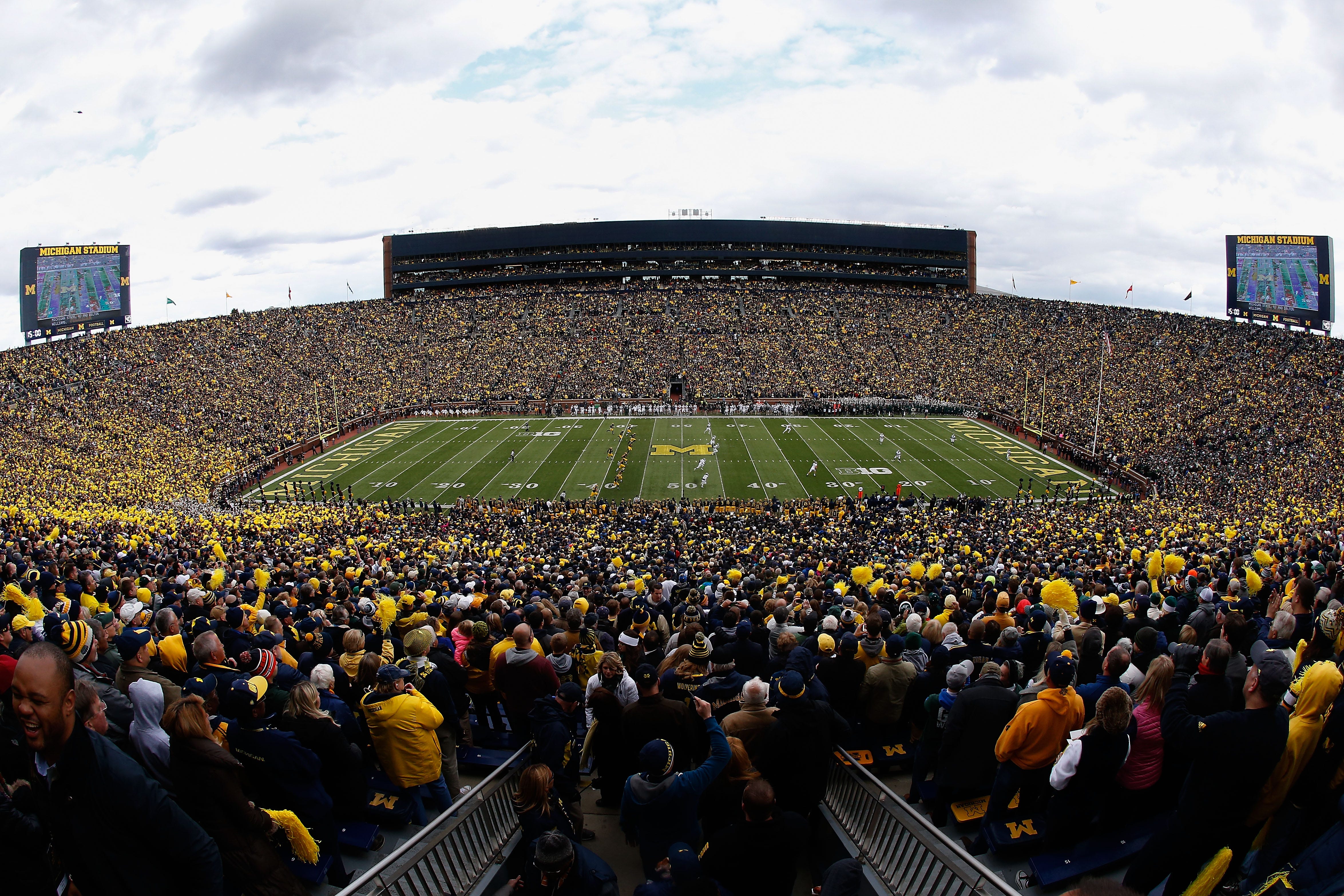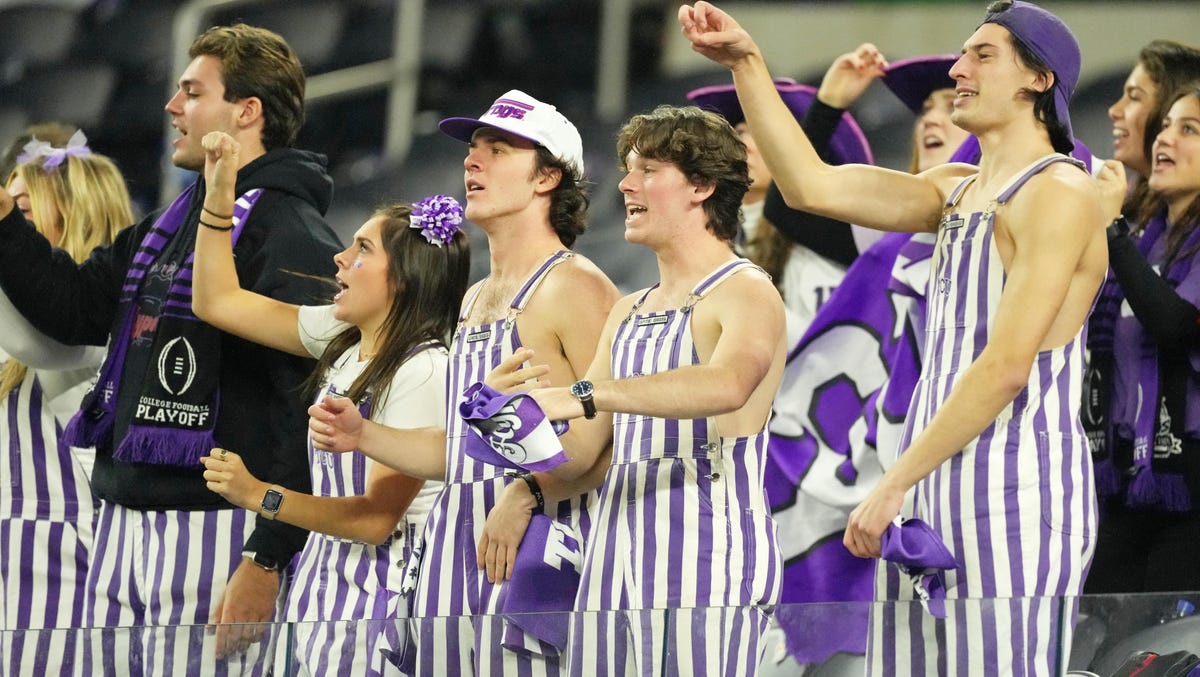College athletics is in an existential crisis, changing from a small business to a bloated and self-indulgent industry where all that matters is feeding the beast.

CFB 150: The best stadiums in college football
SportsPulse: Paul Myerberg puts his opinion hat on and gives his three favorite college football stadiums. Watch to see if your team made the list!
USA TODAY
When whatever’s going to happen finally happens, the long descent of college athletics into one of America’s most contemptible institutions will be complete. The life’s work of clueless college presidents, soulless conference commissioners and greedy athletics administrators will be the ruin of tradition, the mockery of common sense and the thirst to keep score in dollars above all other metrics.
Look at the dysfunctional industry they’ve built around one of the best on-field products in the world. Look at their determination to ruin what so many people enjoyed for so long. Look at what a shambolic mess College Sports Inc. has shown itself to be this week, throwing itself into a panic spiral that is likely to end with something none of them really wanted in the first place.
By the end of a Board of Regents meeting Thursday night, Arizona could well be the latest to move from the Pac-12 to the Big 12, following Colorado last week. There is a good chance the Wildcats’ departure will be linked to Arizona State and Utah, giving the new and resilient Big 12 its Western flank.
With the Pac-12 looking like a freshly picked-over carcass, the Big Ten stands poised to add Oregon and Washington, and perhaps Stanford and California as well, at a heavily discounted rate while Oregon State and Washington State get left in the wilderness and the Pac-12 as we know it folds up shop.
Meanwhile on the other coast, Florida State has essentially declared war on the ACC, saying that its $40 million per year payout in media rights isn’t enough to compete with the SEC and Big Ten. Even though it’s unclear where Florida State intends to go or how it plans to legally navigate a Grant of Rights agreement that would seem to lock them into the ACC until 2036, school president Rick McCullough is now loudly and publicly saying the Seminoles want out — an event that could destabilize the ACC the same way the Pac-12 is getting ransacked piece by piece.
Unless someone gets control of this thing, college sports are headed quickly toward 20-team super leagues, the extinction of a Pac-12 that has served its members well since the 1960s and a further solidification of the reality that this is kill-or-be-killed pro sports — while administrators argue in front of Congress that they deserve legal protections for their “amateur” model.
What a bunch of hypocrites. What a bunch of failed leaders and pathetic backstabbers.
If this is what 20 years of treating each other like financial competitors rather than business partners has wrought, what do you think the next 20 is going to look like? Do you really think it ends here?
Of course it doesn’t.
The fight to concentrate and divide the financial power of college sports into fewer hands has given conferences and schools the go-ahead to do literally anything they want to stay on the right side of a line that is always moving toward the top. We can argue about who did it first or who’s to blame, but the real answer is everybody.
Texas felt like it was slipping out of the club, so it sold out the Big 12 to jump to an SEC where it will make more money but have less of an advantage competitively. Southern Cal got antsy with the Pac-12, so it engineered a move to the Big Ten and brought UCLA along, delivering a blow that nobody could have recovered from.
Now Florida State seeks to do the same, and why would they think a document is going to stop them? The precedent in college sports, from institutions to athletics directors to coaches and athletes on down is that contracts and commitments don’t mean anything. Everyone is free to do business with — and prey upon — whomever they please.
There was no better representation of the fecklessness of college sports than the NCAA coming in Wednesday with an announcement of first-year president Charlie Baker’s “goals and strategies” designed to take on the “period of dramatic transformation” they all find themselves in.
The news release included lots of nice-looking flow charts and corporate jargon that was undoubtedly crafted by an expensive consulting firm. It’s the kind of thing a normal business of the NCAA’s size would do under a new leader: New job responsibilities, revenue-generation initiatives, setting goals and so forth.
It also underscored how frivolous the NCAA has become, because it completely ignored the reality of what was happening on its watch. If the national organization has no way to address an existential crisis of this magnitude going on with its most valuable members, why does it exist in the first place?
And it won’t stop even when the maps get redrawn beyond all recognition because Florida State is not the exception. They’re just the ones saying it out loud: They believe they bring more value to the ACC than they are getting, and they’re almost certainly right.
But that’s not unique. Alabama and Georgia bring more value to the SEC than Vanderbilt and Mississippi State, yet they’re getting the same check. The same applies to Ohio State and Michigan versus Northwestern and Purdue.
They’re OK with that — for now. Will they feel the same a decade into the future? What about when some judge says that schools have to start sharing revenue with players and paying salaries? Do you think those prime schools are going to even hesitate in leaving their longtime partners behind so that they can take a bigger share?
We have 40 years of data telling us exactly where this enterprise is heading, and nobody is going to like it except the handful of schools at the very top. That’s the existential crisis at hand: Not NIL, not making players employees, not the transfer portal or anything like that but rather the very idea that your university is disposable if it’s not one of the top 30 revenue-generators.
There are a lot of reasons it happened this way, but mostly because college sports changed from a small business to a bloated, self-indulgent industry where administrators could expect close to a seven-figure annual salary, getting wined and dined at five-star resorts and a level of fame that fed their voracious egos if they rose high enough in the industry.
And the way to get there was, of course, to keep raising — and, more importantly, spending — ridiculous amounts of money. All that mattered was feeding the beast. You build fancy locker rooms, you hand out massive contract extensions to coaches who have one good year, you hire an army of deputy athletic directors to do redundant jobs. You kept moving up the ladder until one day you were running one of the big schools or maybe even an entire conference.
And the television networks were right there riding shotgun, shoveling more money into their pocket every decade or so, making them think that the gravy train would never stop.
Now, the television business is changing. ESPN and Fox are becoming more choosy about where they spend. As the Pac-12 found out during the last year of media rights negotiations, there was nobody else out there to rescue them. As the ACC explores options to grow revenue and calm the waters with unhappy members like Florida State and Clemson, it will likely find the same thing.
But decades of being hooked on those dollars will justify whatever dirty business they choose to do. The mangled value system of College Sports Inc. has ensured there’s no other way for them to operate.

